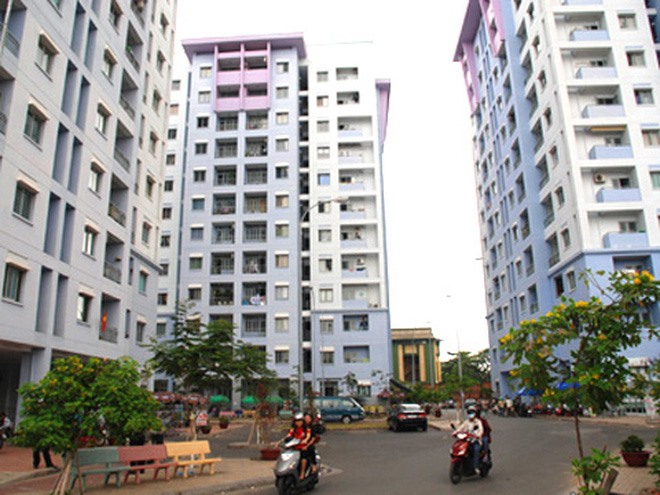 Society
Society

 |
| The Đại Kim resettlement area in Ha Noi’s Hoang Mai District. https://cafef.vn |
HÀ NỘI – Capital city authorities are encouraging displaced residents to accept money to build new homes instead of moving to State-built resettlement areas.
The move comes amidst a plethora of problems with site clearance and residents expressing concerns over the low quality of resettlement houses offered.
Although no detail was given on how the funding would be calculated, officials said the move would benefit both sides.
In the coming time, the city hopes to complete site clearance for 2,700 projects, including 52 key ones.
Total land acquisition will be nearly 6,000ha, and it will affect 80,000 households.
To meet this target, the city authorities need VNĐ60 trillion (US$2.64 billion) for land compensation and arranging resettlement area for 19,000 households.
Since site clearance is key to speedy implementation of projects, the authorities are feeling the pressure of meeting the set target.
Previously, investment in resettlement projects was often made by State agencies or some State-owned enterprises in the form of investment in technical infrastructure, social infrastructure and urban-development construction such as in the urban areas of South Trung Yên, Phú Diễn and Trần Phú.
In order to invest in resettlement houses, Hà Nội authorities need an estimated capital of VNĐ40 trillion from now to 2020. This exceeds the previously set resettlement budget, so raising the funds will be a difficult, slow process.
Despite being accorded top priority, the scheme to build houses to sell to residents has proved highly ineffective.
In a candid assessment, Prof. Đặng Hùng Võ, a property expert, said that no matter what the investment form, the quality of resettlement houses has been poor, the State offices’ management capacity was weak, and construction delayed well beyond the schedule.
Fearing the poor quality of resettlement housing, many residents have hesitated to move, creating the paradox of several complexes standing abandoned while many lack accommodation.
In this situation, the idea of assisting residents with money is seen as a “good measure” to speed up the progress of site clearance and reduce the pressure on resettlement housing.
Phạm Sỹ Liêm, deputy chairman of the Việt Nam Construction Association, said the plan would create favourable conditions for both residents and city authorities.
Instead of building resettlement housing, the city would construct a commercial centre that brings money to the city budget for investing in other projects.
Additionally, the work of site clearance would become easier for district authorities, he said.
Nguyễn Hữu Lợi’s house was on land earmarked for a ring-road project ( Ngã Tư Sở-Ngã Tư Vọng).
Lợi’s family had traditionally been businesspeople, so he said he would use the compensation to build a residential house with a shop area on the ground floor.
With many people having a home-based business as their main source of income, they welcomed the measure to be given money to build a new house on their own, instead of moving to a resettlement complex built with State Budget funds, reported Đấu thầu (Bidding) newspaper.
Nguyễn Sỹ Bảo, director of the Project Management Unit of Hà Nội Civil and Industrial Construction Investment Joint-stock Company, said over 40 per cent of households related to the ring-road project had agreed with the solution.
However, many did not accept the offered compensation of VNĐ6.8 million/sq.m.
Trần Đông Dực, Head of Cầu Giấy District’s Site Clearance Board, said the measure to give support money for residents to build their own houses made sense given that the city was experiencing a shortage of land for resettlement housing.
Liêm said the most important aspect of the new measure is that the compensation should be based on market prices, ensuring equal benefits to all residents.-- VNS




